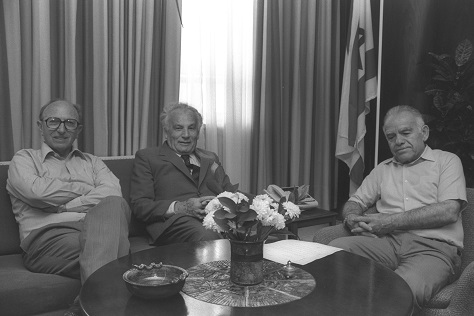State Comptroller and Ombudsman of Israel (1982-1987)
Yitzhak Tunik (1911-1989) was the State Comptroller and Ombudsman of the State of Israel from 1982 to 1987. Prior to his appointment, he served as a judge, the president of the Bar Association and the Chief Military Prosecutor.
Family Background
Yitzhak Tunik was born on January 6th, 1911, in Stolpce (currently - Belarus), to a family of 10 siblings. His family immigrated to Israel in 1934 and settled in Jerusalem.
Education & Military Service
In his youth he studied at the Mir Yeshiva in Lithuania. Upon his arrival in Israel, Tunik studied Law at the Law School of the British Mandate Government. In 1945, following graduation, he started a private law firm in Jerusalem.
In 1948, he was appointed as a Magistrate Judge in Jerusalem, and in 1949-1950 served as the Chief Military Prosecutor under the command of the Military Advocate General, Aharon Hoter-Yishai.
Professional Background
Upon his discharge from the IDF, Tunik Became an associate in a law firm founded by his former commander, Aharon Hoter-Yishai. In 1960, he joined, as an associate to the law firm of Jacob Meltz, who later replaced Tunik as the State Comptroller and Ombudsman.
In 1972, Tunik was elected to serve as the president of the Bar Association and served in this role until 1979. On January 14th, 1982, he was appointed as State Comptroller and Ombudsman and served in this role until January 7th, 1987. During his term in office, Tunik was amongst the drafters of the basic law: State Comptroller and amongst the initiators of the national commission of inquiry on bank stock regulation (the Bejski committee).
Additional Roles
Tunik served as the president of the Israeli Society for Friends of the Hebrew University of Jerusalem. He served as the chair of the committee on additional occupations of members of the Knesset. Due to the findings of the committee, members of the Knesset could no longer serve as heads of local authorities in addition to their legislative role. Tunik was a member of the Judicial Selection Committee in mid 1960s and again in 1978-1981. As an attorney, he represented detainees in famous affairs, including the “Lavon Affair”.
Yitzhak Tunik passed away on January 9th, 1989.












